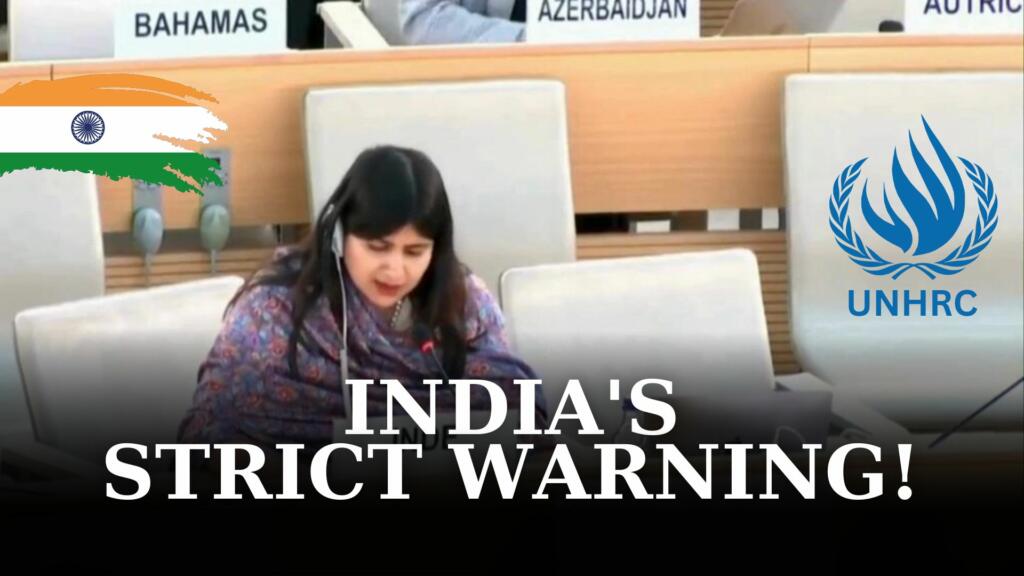At the 55th Human Rights Council of the United Nations, India took a decisive stand against unwarranted interference from Pakistan and Turkey regarding the internal matters of Jammu and Kashmir. Through its ‘Right to Reply’, India’s First Secretary, Anupama Singh, delivered a robust response, reaffirming the sovereignty of the nation and calling out the dubious records of both Pakistan and Turkey in various domains.
Assertion of Sovereignty
India’s firm stance on the sovereignty of Jammu and Kashmir and Ladakh reverberated through its response at the 55th Human Rights Council of the United Nations. Emphasizing the integral nature of these regions within its territory, India reiterated that the constitutional measures implemented by the Indian government are designed to foster socio-economic development and ensure effective governance within these areas.
The core of India’s position lies in its assertion that any discourse concerning Jammu and Kashmir must be acknowledged as an internal matter of the nation. This categorical statement underscores India’s unwavering commitment to safeguarding its territorial integrity and preserving its sovereign rights. By reiterating the principle of non-interference, India unequivocally conveyed that external intervention in matters pertaining to Jammu and Kashmir is unwarranted and unacceptable.
This resolute stance reflects India’s steadfast dedication to upholding the rule of law, democratic principles, and constitutional norms. By affirming the internal nature of the issues concerning Jammu and Kashmir, India asserts its prerogative to address and resolve these matters through legitimate democratic processes and within the framework of its constitutional framework.
Moreover, India’s assertion of sovereignty underscores its determination to block any attempts aimed at undermining its territorial integrity or impinging upon its sovereign rights. In doing so, India reiterates its commitment to fostering peace, stability, and development within the region, while simultaneously safeguarding the fundamental rights and aspirations of its citizens.
Condemnation of Pakistan’s Hypocrisy
Anupama Singh’s condemnation of Pakistan’s hypocrisy at the 55th Human Rights Council of the United Nations was a resolute response to Pakistan’s unwarranted criticism and interference in India’s internal affairs. Singh’s remarks underscored Pakistan’s audacity in attempting to lecture India on human rights issues while turning a blind eye to its own egregious violations and failures.
Pakistan’s dismal track record on human rights was laid bare, with Singh highlighting the nation’s systemic persecution of minorities as a grave concern. Incidents such as the Jaranwala attacks on Christian communities served as poignant examples of Pakistan’s failure to protect the rights and freedoms of its minority populations. The wanton destruction of churches and homes, accompanied by violence and intimidation, stands as a stark indictment of Pakistan’s failure to uphold the most basic principles of human rights and religious freedom.
Moreover, Singh’s condemnation extended to Pakistan’s continued support for terrorism, which poses a grave threat to regional peace and stability. Pakistan’s history of harboring and sponsoring terrorist organizations, including those sanctioned by the United Nations Security Council, undermines its credibility as a responsible member of the international community. By turning a blind eye to terrorism within its borders and actively supporting extremist elements, Pakistan not only endangers the lives and livelihoods of its own citizens but also destabilizes the entire region.
Also Read: Damming Diplomacy: India’s Barrier on Ravi River Sends Message to Pakistan
Rebuke to Turkey
India’s response at the 55th Human Rights Council of the United Nations included a clear and stern rebuke to Turkey for its unwarranted comments on the internal matters of India, particularly regarding Jammu and Kashmir. Through this rebuke, India conveyed its strong disapproval of Turkey’s interference and emphasized the importance of respecting the principles of sovereignty and non-interference in international relations.
India issued a stern warning to Turkey, reminding the nation of the imperative to refrain from meddling in the internal affairs of sovereign states. By doing so, India underscored its commitment to upholding its sovereignty and autonomy in addressing internal issues, such as those pertaining to Jammu and Kashmir. The warning served as a firm reminder to Turkey that any attempts to infringe upon India’s internal affairs would not be tolerated and would be met with appropriate diplomatic responses.
Emphasis on Democratic Values
India’s response at the 55th Human Rights Council of the United Nations also emphasized its unwavering commitment to pluralism and democratic values, contrasting its ethos with the authoritarian tendencies observed in countries like Pakistan and Turkey. Through this emphasis, India sought to underscore its status as a beacon of democracy and diversity in a region where such principles are often under threat.
India reiterated its commitment to pluralism, emphasizing the importance of respecting and celebrating diversity within its borders. As a nation with a rich tapestry of cultures, languages, and religions, India recognizes the value of pluralism in fostering social cohesion and promoting inclusivity. By upholding the principles of pluralism, India affirms its belief in the equal rights and dignity of all its citizens, regardless of their background or beliefs.
Furthermore, India highlighted its democratic credentials as a cornerstone of its governance model. As the world’s largest democracy, India has demonstrated its commitment to upholding the rule of law, protecting individual liberties, and ensuring political participation for all its citizens. Through free and fair elections, robust institutions, and a vibrant civil society, India has established itself as a shining example of democratic governance in a region plagued by authoritarianism and repression.
India’s response at the UN Human Rights Council exemplifies its unwavering commitment to sovereignty, democratic values, and accountability. By firmly rebuffing Pakistan and Turkey’s attempts to meddle in its internal affairs, India reaffirmed its status as a responsible global player, dedicated to upholding the principles of justice, equality, and self-determination. As the international community continues to navigate complex geopolitical dynamics, India’s stance serves as a reminder of the importance of respecting national sovereignty and refraining from unwarranted interference in the affairs of sovereign states.
Also Read: From blasts to blossoms: PM Modi’s vision transforms J&K post 370
